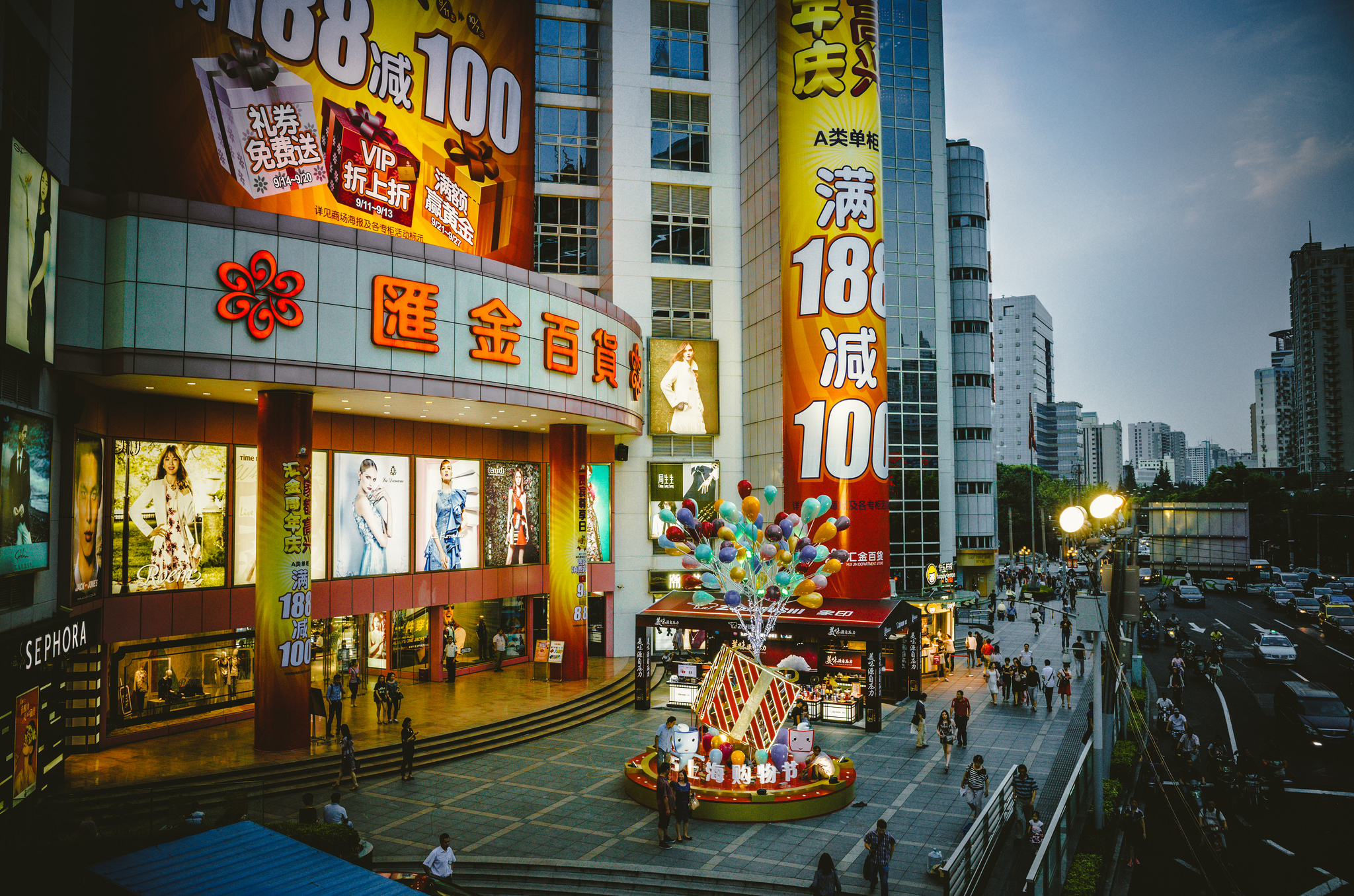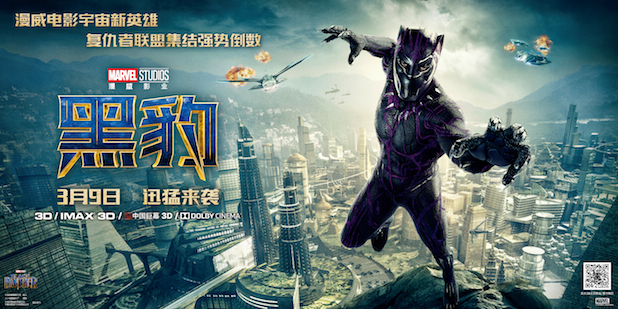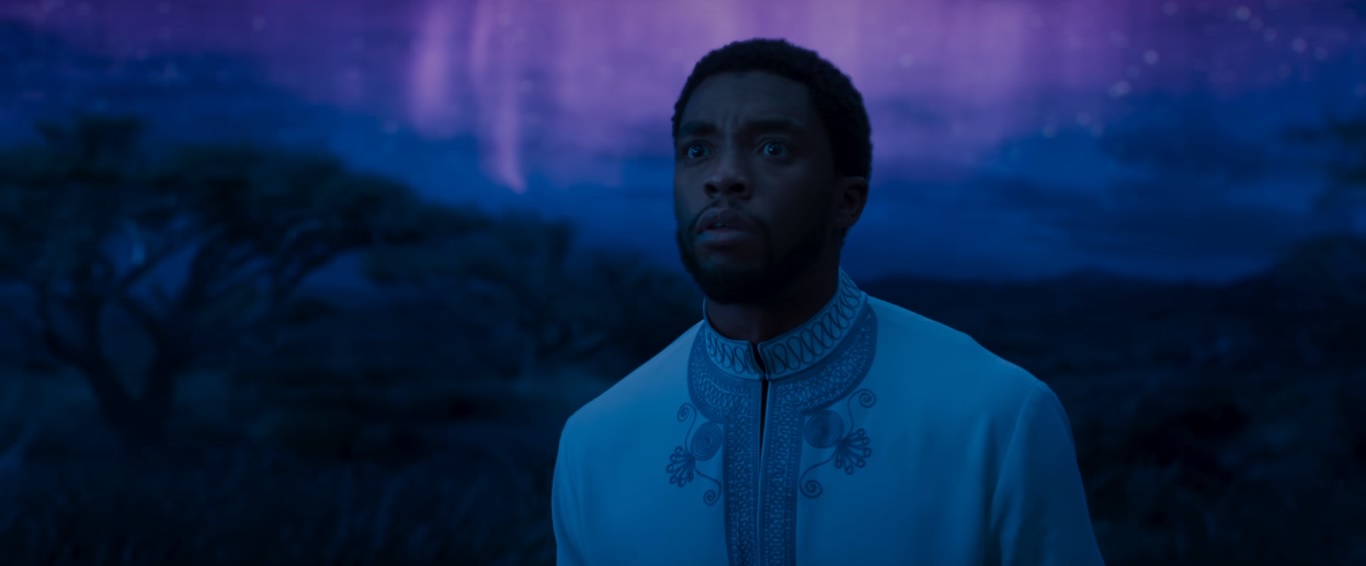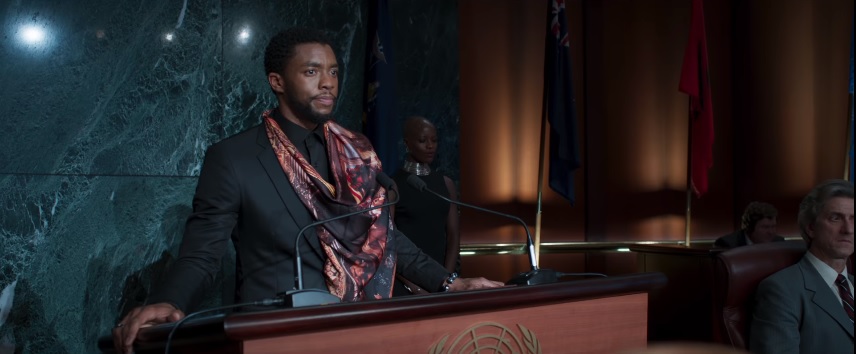(Photo credit: Marvel Studios/screenshot)
Black Panther has opened in China to the tune of $60+ million, a staggering feat for a film featuring a mostly black cast. However, it’s a Black Panther-themed article has been making its rounds recently, and it’s one that puts China in an extremely bad light.
According to Quartz’s Echo Huang, Chinese moviegoers have been complaining about Black Panther because there’s–surprise surprise–black people in the movie.
Some of the reviews that have been left on Chinese IMDb-like site Douban, include concerns about Chinese audiences not being used to seeing black people on screen. Other reviews complained about the “darkness” of the theater.
“When I entered the theater, a bunch of black people was fighting in the night… I’ve never been in a theater so dark that I couldn’t find my seat,” wrote one reviewer. Another wrote, “The film is filled with black actors and actresses. Also, because the film’s colors are a bit dark, it’s nearly a torture for the eyes to watch the film’s 3D version in the theater.”
The incendiary comments highlighted in the article has made this article both a point of contention for some while being proof of the supposed “obvious” to others. Some are like me, who think that while the article isn’t wrong, there’s definitely more to the story.
“I don’t doubt anti-blackness in NBPOC communities but those racist Black Panther reviews from China popping up seem suspicious. I’d like to see them translated by more than [one] person,” wrote filmmaker Lexi Alexander on Twitter. “Remember, America loves to blame foreign countries for not casting POC.”
Is the article a case of rummaging for, as one Twitter user put it, “a divisive narrative” by cherry-picking for racist reviews, or is it just relating one part of a complicated story? Because, if we’re clear, anti-blackness in China isn’t something new.
China’s anti-blackness problem

The Lunar New Year was capped off in China with their annual CCTV New Year’s Gala. During the gala, actors performed a skit supposedly lauding the international relations between Africa and China, but instead of actually respectfully showcasing international unity, some actors were wearing blackface and other body prosthetics in order to portray African characters. The skit was roundly panned by international viewers. However, as The Outline’s Eileen Guo wrote, citing a report from the Washington Post, “China’s Foreign Ministry remained defiant in the face of criticism of the skit, accusing outsiders of exploiting the controversy in an attempt to hinder China’s economic development in Africa.”
China’s anti-blackness goes deeper than just surface stereotypes. It’s a deeply-rooted cultural issue.
What’s fascinating to me is that it seems like as a whole, the Chinese government doesn’t realize how rampant racism is bound to negatively affect them financially in the long run. The number of African immigrants coming to China is rapidly decreasing due to harsh immigration laws and, yes, the racism, which includes people believing black people smell, are dirty, and are prone to crime.
The racist treatment is so bad and so rampant that many immigrants are returning to Africa and telling their friends and others who are looking to make a better life for themselves to not go to Africa.
Quartz’s Lily Kuo spoke to Lamin Ceesay, a Gambian man who moved to Guangzhou for economic opportunity.
“It was very developed. The tall buildings, everything was colorful. I thought, okay my life is going to change. It’s going to be better. Life is good here,” he said. However, his experience ended up being horrible, so much so that when he moved back to Gambia, he started a Facebook group “Gambians Nightmare in China” inspired by his experience, which included being jobless after finding out the job he was promised by visa dealers didn’t exist, and when he tried to move to Hong Kong to find better work, he was taken back to Guangzhou by police.
The page’s content has inspired research website, Uturn Asia, developed by migration researchers Heidi Øtsbø Haugen from the University of Oslo and Manon Diederich from the Unversity of Cologne.
“What happened to them has happened to Africans of other nationalities earlier,” Øtsbø Haugen said. “But their desire to prevent others from ending up in the same situation is unique.”
(Ceesay’s own brother left for Europe via Libya, where was last heard from; as has been reported by various outlets, Libya has a booming slave trade that is as shocking to see in this day and age as it is horrific.)
Black immigrants who stick it out can face racism up close and personal. Moustapha Dieng, a former Senegalese air force airplane engineer, told CNN’s Jenni Marsh “that locals hold their noses when riding the shared lift in their residential high rise, while a Chinese landlady complained to NetEase, a Chinese news portal, that her African tenant’s black skin color came off on the ‘snow white walls’–echoing a recent racist TV advert that suggested African blackness can be washed off.”
Of course, everyone’s experience in a place varies, but generally speaking, the racist attitudes towards blackness in China affect not just many Africans, but black expats from any country, including Niesha Davis, a writer and editor currently living in Shanghai.
“I moved to China in 2015 in the hope of earning good money as an English teacher and exploring more of Asia during my off-time. And it is true that my experience in Shanghai has been quite lucrative for my career since then. Yet to paraphrase the African-American poet Langston Hughes, life for most black people in China isn’t a crystal stair,” she wrote for Sixth Tone. “Chinese beauty standards put whiteness at a premium; some women regularly bleach their skin, for example. But these aesthetics run deeper than skin color: The popularity of plastic surgery procedures designed to widen and brighten the eyes reflects a widespread acceptance of Caucasian, Eurocentric beauty standards. Often, I feel as if my very existence as a dark-skinned black woman is in opposition to what some Chinese people find aesthetically beautiful, a tension that has made me feel disrespected in certain social interactions.”
“…[M]y own experiences indicate that this notion exists much more prominently in China than in the U.S,” she wrote. “I have witnessed passengers blatantly cover their noses as I enter a subway carriage; once, while on holiday in Hong Kong, a department store clerk who was demonstrating a brand of soap on my hand even joked that my skin was dark because the poor air quality on the Chinese mainland had made it dirty.”
If China plans on being a global player, especially where their relationship with Africa is concerned, it would behoove them to make life easier for their African and African-diasporic immigrants. Having immigrants tell others not to invest in China is not just bad PR, it’s bad for China’s future as a global player. The more globalized the world becomes, the more every country will be forced to work in tandem with each other. In short, if China wants to be competitive, they should start welcoming immigrants with open arms and implementing projects and programs that will help support these immigrants. For all of their own problems with regards to race and colorism, the South Korean government has made multiculturalism and attracting immigrants top issues, something when I expound more on in this article about the Rainbow Chorus of the Center for Multicultural Korea.
Limited exposure

The messages coming from international entertainment (such as American entertainment) don’t help matters, with many black characters never showcasing the full scope, beauty, and complexity of the black diasporic experience. But while Black Panther is a movie that revels in its blackness, it’s also a film that can’t be expected to change decades of anit-black animosity overnight. It also can’t be expected to educate Chinese audiences (and Asian audiences as a whole) about blackness in its entirety. The film does go to great lengths to discuss heady issues such as colonialism and its effects, but for a nation which has limited exposure to black cultures and black issues, the education on blackness must continue and it must be a vigorous undertaking.
“I find that a lot of stereotypes in China come from a limited exposure to diversity, so assumptions are made reflexively,” Shanghai resident and university lecturer Marcel Daniels told Davis. “Hopefully this film sparks interest in Chinese viewers to learn more about the history, people, and cultures of those from Africa.” Kristen Stanley, owner of Liason Luxury Sport and Entertainment Agency in Shanghai, said three of her Black Panther theater events were sold out. “The perceptoin of black people around the world is changing and this movie will continue that trend,” she said.
But, wrote Davis, Black Panther still “primarily addresses comparatively subtle Western stereotypes of black people. When transposed onto the Chinese context–a society in which crude racial stereotypes pervade national televsiion–some of the film’s celebration of African pluralism might be lost in translation.”
Indeed, some of the film’s 6.8 out 10 Douban rating might be because the film is seen as one too rooted in Westernism. Guo spoke to Yang Yang, a moviegoer who had seen the film. She felt that “more than anything, the film espoused ‘the universal values of the United States.’ She explained how, at the end of the film, T’Challa had gone from ‘saving the people of his country’ to exporting technology’ to the rest of the world–‘much like how the United States operates in global politics.'”
Another reason is because the film might literally be lost in translation. As Guo wrote, a screening she attended in Chengdu only recieved a few laughs at the appropriate times, with much of the meaning of the film altered either by a lack of connection to “cultural touchstones that immediately registered with American audiences,” or bad translations of lines from the film.
“When T’Challa indignantly tells Okoye, ‘I never freeze!’ as he’s about to head out on a mission to fetch ex-girlfriend Nakia, it’s translated to ‘My leg is fine!'” she wrote. “When he re-enters Wakanda, the barren world beyond its borders giving way to civilization, he says, ‘This never gets old,’ which is translated into the far blander, ‘It’s so beautiful.'”
Still, as Davis wrote, Black Panther “can still be a start.” For those that came away loving the film, it can definitely spark a yearning to learn more about the issues facing black people around the world, including China. It certainly seems like that’s the case for viewers who attended one screening.
Black Panther “gives us a great impression”
YouTube creator Wode Maya made a video of him and another interviewer asking Chinese Black Panther viewers what they thought of the film. Many of them came away loving the film for its complexity. A lot of them also addressed the film’s focus on black identity, saying that it gave them a bigger appreciation for black culture and reiterated the fact that everyone can live in harmony together.
“I think there is no difference between black and other races,” one responder said. “We are all one.”
Despite one guy’s comments about the film showing the “same hip hop way of life,” the video is in stark contrast to the Douban comments, and showcases a Chinese audience that not only recognizes the importance of Black Panther in a global sense, but also appreciates its messages. The video also drives home a point that is important to remember when thinking about international relations–no nation is a monolith. Yes, China has tons of issues to work on, as does the United States, but it would be flat to say that all Chinese people hate the film.
That’s not negating the Quartz article, though–I’m completely sure there are people in China who despise this film because it’s rooted in blackness. Anti-black sentiment doesn’t stop just because Black Panther is a Marvel movie. But from where I’m sitting, the film’s reception is just as complicated as the politics the film itself asserts. There are many reasons why Black Panther might not be catching on in China the way it has in America or other parts of the world. But, with the people it has touched in China, it’s a huge success, and I’d wager that there are as many people who love the film in China as there are who hate it.
Aside from doing well financially in an international market (which was already achieved without China’s help) the ultimate goal of a film like Black Panther is to start conversation, and with the interviewees in Maya’s interview, it would seem that the spark for change has been lit. Thus, the film has been a success.
The same spark for conversation happened with Korean viewers as well, as recorded by Asian Boss. While some weren’t used to a Marvel film pertaining to anything outside of the standard white daring-do, many viewers of Black Panther came away from the film gathering more respect for black people and found themselves thinking about how racial politics affect how they have viewed black people and black cultures before watching the film. They also expressed hope that Marvel would turn their attention to Korean and Asian Marvel superheroes.
Hollywood has had the thought that black-led films wouldn’t do well overseas because the audience would be able to connect to their themes. To me, I think the opposite has happened; Black Panther has done well because of its ability to spark conversation with its audience. Even the conversation being had now surrounding the Quartz article has the ability to effect change in those who read the article itself. It can make people want to do better and be better. Even in what looks like a failure, Black Panther is still doing its work.
Movies as agents of healing and change

While China has its own issues to sort out, some stress would be alleviated if Hollywood (which can act as another arm of America’s Westernized racial propaganda) churned out more films for everyone to enjoy. If Hollywood was keen on making more films featuring actors of color, perhaps the myth that POC-led films doing poorly overseas wouldn’t exist in the first place and more audiences would be exposed to people of all types on a more regular basis. The more people are exposed to others, the more empathy they can develop. The more empathy develops, the less racism and bigotry exists. It sounds simple, but it’s only simple in writing; in practice it’s hard. It requires Hollywood to be more vigilant about the films it produces and who gets cast in those films. It requires an understanding of how images color our views of each other and ourselves, for better or worse.
The only reason the myth of the POC-led international failure exists is to assuage Hollywood’s conscience about its discriminatory practices. But the industry fails to understand how far reaching their power actually is. One of our biggest exports is our culture, and a lot of that culture includes our films. If our films are what we are selling to the world as an indicator of the “American ideal,” and if those films have mostly white people in the leads, then what’s the message other than that whiteness, and only whiteness, equates to Americanism? It’s this message that is encoded in China’s preference for European white collar workers. It’s the message that an appearance of whiteness equates to success, status, and prestige. Meanwhile, images of black characters are often images of people in degradation. There hasn’t been a joyous celebration of blackness in the mainstream that has held the attention of the worldwide stage in the same manner that Black Panther is doing.
But this needs to happen more often. If Hollywood learns anything from Black Panther‘s time in the international spotlight, it should be that images do indeed matter. All of the globe, black people have gathered in theaters to see a positive reflection of themselves. Many of the non-black friends and strangers alike have also gathered and, thankfully, there are examples of them leaving with changed outlooks. Images like Black Panther can be healing for everyone, and the more films like this are made so that everyone can see themselves on screen, the more healing the movie-making industry can become.
It’s also important for us as viewers to remember that when a film like Black Panther starts global conversation, not all of those conversations will be easy or pleasant to listen to, as the Quartz article illustrates. Moments of illumination showcase what is hiding in the darkness, and there lies the opportunity to root it out. Black Panther is giving its viewers the opportunity to root out their own inner biases, but it is only up to the individual to recognize and seize the moment.♦
Loved this article? Follow JUST ADD COLOR at @COLORwebmag and on Facebook! If you want to support more writing like this, donate to my Ko-fi account!
